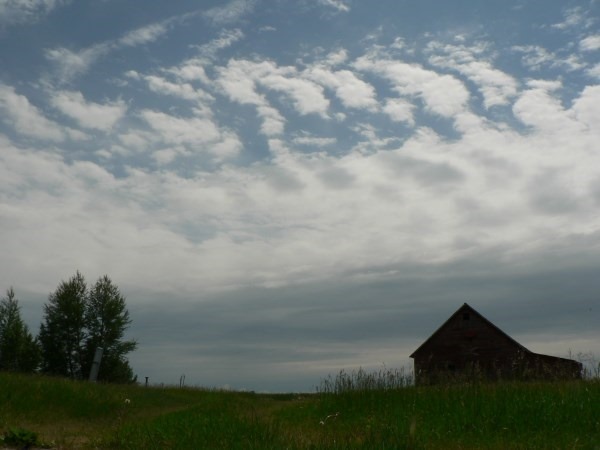The boy is skinny, big-eyed, big-eared, likes being outside. He is attentive to little shifts of light, of colour, of wind, of harmonies in prairie grasses. He likes the sun, the clouds and rain storms, feels them under his skin. He likes swallows, marshes, cattails, willows, he gives willow trees first names. He likes his bicycle and smooth dirt trails that send small shudders from his stomach to his throat. He likes the creek at the edge of town, builds rafts and floats, falls asleep listening to frogs. He likes to follow animal tracks through bush, deep cow paths over pastures, and bending trails, forgotten by wheels, reclaimed by couch grass and saplings. He likes lying alone in the hayloft. He likes to be unnoticed, watch people from a distance, especially happy people, couples sitting close in cars. He is shy, nervous in Sunday School; in public school he daydreams, wonders through windows, waits for the bell. He wants to please his father, works hard at this difficult task. He loves many things, finds nothing to argue about. Like the man he loves the dawn.
The man remembers the boy. Thinks of him, wonders if the boy would recognize him if he came walking down the sidewalk in front of Springside General Store. It’s a question he wakes up to after a fitful dream. The man, too, likes the out-of-doors, the sun, the clouds, the rain, the wind, then he goes about checking and preparing many things before stepping outside. His eyes, behind glasses, have narrowed, his waist, thickened, hair thinned. His movements have slowed and his skin has slackened, it seems to have lost its receptivity to subtle shifts. He grows self-conscious about all this. The man is timorous and often nervous but has learned elaborate tricks and developed habits—he is deft at deflection. He loves many things, longs for many things, and argues with himself. He wants to please many people, have his thoughts well in hand, be received, all this makes him suffer. He waits for the dawn.
Last night the man fell into a dream. Felt the night, and ran. A dark wall swung into him like a bludgeon then fell on him—an amorphous weight, something spectral with mass, pinned him. Nothing to be done. Just try to breath.
This morning, something resembling forgiveness. But when I say this word do not think of God or sin or anything like that. Think instead of an opening, think of light at the edge of a curtain, think of a forgotten dream remembered, think of a lost thing found, carried, held with care, then passed along. Think of a man learning to follow a boy.


A moving description of forgiveness by remembering the delights of innocent youth.
Thank you Raymond!
Gorgeous. Thank you Stephen. Your writing is a balm.
wonders if the boy would recognize him if he came walking down the sidewalk … oh my.
Think of a man learning to follow a boy. It’s never too late to fix a mistake.
Thank you Lorri! Lovely for you to say.
Thank you Adela. As we age, as experience changes us, it is a real question, don’t you think? Thank you for reading!
Thanks for your comment Carlos. I believe, and hope, you’re right.
Beautiful Steve. I may have missed entirely what you meant, but what comes to my mind, what I experience, is this: time is hard to forgive, at times impossible. I wouldn’t want the child back completely, not the naiveté at least, but the optimism, the dreams, the vitality, the easy sleep, the strength, the spring in my step? Yes. There is, as you said, little to be done under the crushing weight of your dream (and often reality) but breathe. And the forgiveness, the light at the edge of the curtain you speak of is, in my experience, sadly sometimes barely a microscopic sliver, inadequate, a little elusive.
Connie, Thank you for this! And I don’t see where you’ve missed anything. Your response and experience adds much to these thoughts. Yes, I don’t want the naivete that allows in what shouldn’t be allowed, but I do want that naivete, that immediacy of innocence, unencumbered mediation, a conscious simplicity… I think it was Paul Ricoeur who talked about a second naiveté. I believe he was getting at this, a kind of reengaged child-like (not childishly naive) reception of the world. But I wonder if this is possible without at least a “microscopic sliver” of forgiveness. Thanks again Connie.
i enjoyed reading this very much Steve.
you’ve always had a richness of words within you, i think.
i guess for this child, forgiveness is like breathing,
so i can let go, so i enjoy the moment, the beauty, the hurt,
the loss, the struggle.
and maybe also, for me, it allows me some lost naivete…
and inwardly i can feel like i’m skipping again
(not that my body would now allow it :))
it wasn’t until i was married that i actually laid in the grass and dreamt.
how wonderful that was!
Thank you Erika! And thank you for your thoughts…beautifully said. It’s never too late to lie on our backs in the grass and dream.
Thanks, Steve – beautifully written, as the others have said. Reflecting on Jesus’ words about the kingdom of heaven being like a little child – the inner kingdom…
And – I married really well!!!
Thank you Sam. An apt connection and reflection.